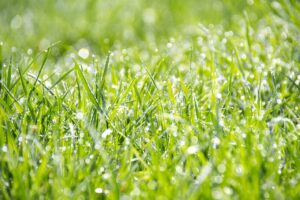Prepare your turf for summer with a biological integrated turf management programme
Related Articles
From microbial inoculants to mycorrhizal fungi, there are several biological products that can aid plant growth and health, writes Dr Deidre Charleston, Origin Amenity Solutions’ Research and Technical Manager – Biological Products.
As spring turns into summer and temperatures rise, life under the ground picks up and soil biology becomes more active. This is a good time to consider how we might take advantage of this activity and include some soil biology and bio-stimulants into our management programmes.
In those cooler parts of the UK, grass may take a little longer to get growing. Fulvic acids can promote plant growth under these conditions and are the most effective organic chelating agents known. Fulvic acids are soluble organic acids. They are small, highly reactive, chemical molecules with a good nutrient exchange capacity. Due to their small size, they can easily enter plant roots, carrying trace minerals into the plant which can improve plant growth. Fulvic acid is also a good source of energy for soil biology and can function as a soil temperature and pH buffer. Consider introducing products to boost plant growth and promote biological activity such as Symbio Fulvic Booster and Symbio CMS Shoot. Later in the season, fulvic acids can continue to act as chelating agents, improving the efficacy of other nutrients and chemicals that may be applied.
Any last minute overseeding or planting tasks before the season gets further underway can be improved with the addition of mycorrhizal fungi, such as Symbio Mycorrhizal Seedcoat; Symbio Mycorrhizal Inoculant and Symbio Liquid Endo Mycorrhizal Inoculant. Most turf grass species associate with arbuscular mycorrhizal fungi (AMF). These specialised fungi colonise the plant roots, making use of the sugary carbohydrates released by the plants into the soil through root exudates. In exchange, the fungal hyphae extend through the soil, enhancing the plant root system and improving plant access to water and nutrients. Mycorrhizal fungi greatly increase the rooting volume, which translates to faster growth and establishment.
Managing organic matter and reducing thatch build-up is a constant chore, but, by taking advantage of soil biology, this task can be reduced. Living soils degrade thatch as quickly as it forms, but for this to work you need two ingredients: soil microbes and air. Populations of beneficial microbes can be depleted in intensively managed environments which results in various issues including thatch accumulation. Thatch degradation can be improved by the introduction of soil biology, specifically beneficial fungi, which are particularly good at breaking down the complex woody material found in thatch. The fungi degrade lignin and cellulose, converting it to humus and releasing organic acids which help to make nutrients plant available. Microbial inoculants such as Symbio ThatchEater and Symbio DegrAid are designed specifically to include beneficial thatch-degrading fungi. The second ingredient, air, is best provided by frequent aeration using micro tines or sorrel rollers, avoiding disruption of the playing surface, and the disturbance of fungal hyphae; or consider the additional application of Symbio Liquid Aeration, which when applied to soil produces a chemical reaction that releases excess oxygen molecules, providing oxygen for beneficial soil microbes. To maintain a diverse living soil throughout the year, consider introducing a regular application of Symbio Compost Tea, or Symbio BioTabs or other products like these that contain diverse populations of beneficial soil biology to help restore the balance between soil chemistry, soil physics and soil biology.
We always hope for a warm, sunny and dry summer, although this can make keeping greens ‘green’ more of a challenge! Hydrophobicity (or soil water repellency) is a common problem in intensively managed turf. This hydrophobicity is created by organic coatings that develop around sand particles, preventing the water from penetrating evenly through the rootzone. Early management of water stress and potential dry patch can improve plant tolerance during hot periods. Plants growing in biologically active soils are better able to tolerate water stress. Management practices that encourage soil biology will have a beneficial impact on plant health. The use of biological inoculants such as Symbio Aquacept can alleviate the issues caused by fungal dry patch. Symbio Aquacept contains beneficial microbes that digest the proteins found in hydrophobic soils. Early application of wetting agents to maintain uniform moisture throughout the rootzone can reduce water stress. Wetting agents like Symbio Supa Yucca, composed from a concentrated natural plant extract (Yucca schidigera), acts as both a bio-stimulant, by providing a carbon source for soil biology, and a wetting agent, by breaking down waxy coatings.
The Met Office is predicting another record-breaking summer with more severe wet, dry and hot extremes. So, although we are not quite into the fullness of summer, now is the time to plan. Working with soil biology and implementing management practices to encourage a healthy soil food web can help to mitigate some of the problems that we might face.
For more information visit www.originamenity.com






























